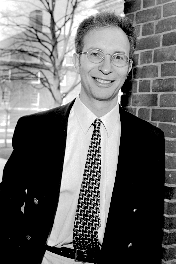|
|
The Hinkley Lecture: American Law Crosses The AtlanticChristine A. RowettHomewood News and Information |

The temporary office of British barrister David Sugarman is strikingly stark. There is no artwork adorning the walls of the Mergenthaler room, save for a few favorite New Yorker cartoons on the door, and few publications line the bookshelves.
But if Sugarman has little time for decorating, the University of Lancaster professor of law and society is to be pardoned. He arrived for one semester at Hopkins just months ago, after being offered the John Hinkley Professorship, which is bestowed in honor of the senior partner of the Baltimore law firm of Hinkley and Singley.

"One classic thing I find and so enjoy about North American students is a certain preparedness to intervene and enter into the discussion," says visiting professor David Sugarman, a British barrister. |
Hinkley, who graduated from Hopkins in 1884, had a special interest in English legal and constitutional history.
Sugarman, who this semester is teaching "Law and Society in England, 1750-1997" to graduate and undergraduate students, shares that interest. He studied in England at the University of Hull and at Cambridge, then came to the United States, where he received his master's and doctorate from Harvard. Though he practiced law in England for a very short time, his goal was always to observe and understand the profession in order to pass it on through teaching.
"At its best," Sugarman said of teaching, "you are aware of the way in which your students develop their critical faculties and possibly enhance their capacity to be good citizens. At its worst, it can be unbelievably tedious, [like] when I have over 200 essays or exams scripts to read, and I get the same answers over and over again."
Until recently, Sugarman served as head of the Law and Society Department at the University of Lancaster. The position involved a large amount of administrative work and little time for hands-on teaching, he said.
"It's pretty demanding and often not a very satisfying job," he said. "This came along at a wonderful time."
One appealing aspect of his tenure in Baltimore, Sugarman said, is the diversity of the students taking his class. His students in England are all undergraduates between 18 and 21. "They've come straight from home and are a bit more reticent, particularly in the early years," Sugarman said. "One classic thing I find and so enjoy about North American students is a certain preparedness to intervene and enter into the discussion."
Still, he says, he has been surprised at the similarities he has recognized in student behavior.
"They all have the same kind of panics around the time essays have to be handed in," he said. "There are some universals."
The essence of law and society in England is changing, Sugarman says, and American influences are partly responsible. Everything from the spectacle of the O.J. Simpson trials and the short skirts worn by attorneys on television's Ally McBeal have served as representation of U.S. justice and have managed to influence legal systems around the world, including traditionalist Britain, he said.
"What's very interesting is the way that it is changing very rapidly," Sugarman said. "Americanization is one of the forces at work here."
For example, transnational deals are constructed using American standards, he said, and the consequences are far-reaching.
"English lawyers increasingly have felt obliged to operate, dress like, have their offices like and talk like American lawyers," Sugarman said. "It obviously raises all kind of issues."
American trends are viewed internationally, Sugarman said. The Supreme Court of the European Union, for example, was "very much influenced" by American standards, he said. "This creates a field day for lawyers and American-style lawyering, which is used to playing the game," he said.
"English law firms have gotten big and international in order to compete with American law firms," he said. "We're talking about not just simply changes in size but massive changes in culture. We're talking about law firms for the first time going into marketing, into image presentation."
On Thursday, April 9, at 4 p.m. in the Garrett Room of the Milton S. Eisenhower Library on the Homewood campus, Sugarman will examine the negative and positive American influences on Britain's longstanding legal institutions and practices. The lecture, titled "L.A. Law Encounters the Common Law Mind," is free and open to the public.
"L.A. Law Encounters the Common Law Mind"
Visiting professor and British barrister David Sugarman examines American influences on Britain's legal system at 4 p.m., April 9, in the Garrett Room of MSEL.
| GO TO APRIL 6, 1998 TABLE OF CONTENTS. |
| GO TO THE GAZETTE HOMEPAGE. |